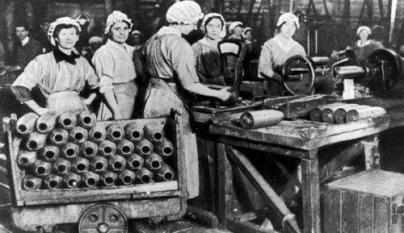
Canaries
We cannot deny that the men who fought in the Great War had it tough. We’ve heard about the rats , the lice and the terrible conditions. We know about shell-shock, trench foot and the daily fear of being picked off by a sniper’s bullet.
They left behind wives, mother and sisters in the knowledge that they would be safe at home. Or would they ?
We cannot diminish the role played by our gallant soldiers but take a look at this picture.
It depicts young women filling shells at a munitions factory. They were called ‘munitionettes’ and by June 1917, 80% of all weapons and ammunition was produced by these courageous women. Many had left more menial roles, such as domestic service, to work at the munitions factories because the pay was better. However, it was still less than 50% of what the men were earning.
The women in this picture are more than likely handling TNT. You will notice that they have no masks, no gloves and no eye protection. Nothing at all to protect them from the effects of this noxious chemical.
Over exposure resulted in their skin turning yellow which led to them being called ‘canaries’. It caused damage to the immune system, liver failure, anaemia and enlargement of the spleen. It also led to problems with their breasts and affected their ability to have children. Many died as a result of these various complaints.
Apart from the devastating health issues, there was also the ever present danger of accidents. They were, after all, working with highly volatile and unstable chemicals.
In 1917, an explosion at a factory killed 73 people and injured 400. At the National Shell Filling Factory in Chilwell, 130 people were killed.
So, as we remember our brave soldiers 100 years on from the Great War, let us look at this picture and remember also the brave ‘munitionettes’ who sacrificed their good health and often, their lives, to keep our armies supplied with weapons and ammunition. We could not have done without them.